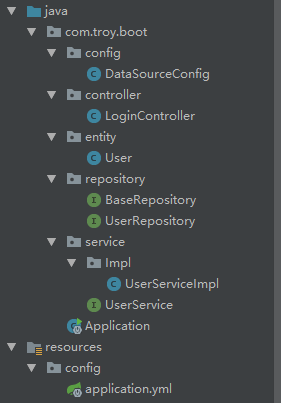spring-boot、spring-data-jpa整合
一、Spring Boot是由Pivotal团队提供的全新框架,其设计目的是用来简化新Spring应用的初始搭建以及开发过程。该框架使用了特定的方式来进行配置,从而使开发人员不再需要定义样板化的配置。通过这种方式,Spring Boot致力于在蓬勃发展的快速应用开发领域(rapid application development)成为领导者。
二、Spring Boot 在配置上面都做了很多的简化。配置文件在resource目录里面,会自动做加载,优先resource下面的config目录配置文件加载,并且,spring-boot里面提供了许多相关的配置包,不需要在像mvc那样配置很多的xml配置文件
三、JPA这里我不多做介绍,可以参考,我原来通过springmvc和spring-data-jpa的整合:http://www.cnblogs.com/ll409546297/p/6992188.html
四、这里介绍spring-boot和JPA的相关配置(简易配置)。看一下目录结构

五、pom.xml配置
<?xml version="1.0" encoding="UTF-8"?> <project xmlns="http://maven.apache.org/POM/4.0.0" xmlns:xsi="http://www.w3.org/2001/XMLSchema-instance" xsi:schemaLocation="http://maven.apache.org/POM/4.0.0 http://maven.apache.org/xsd/maven-4.0.0.xsd"> <modelVersion>4.0.0</modelVersion> <groupId>com.troy</groupId> <artifactId>springboot</artifactId> <version>1.0-SNAPSHOT</version> <parent> <groupId>org.springframework.boot</groupId> <artifactId>spring-boot-starter-parent</artifactId> <version>1.5.6.RELEASE</version> </parent> <dependencies> <dependency> <groupId>org.springframework.boot</groupId> <artifactId>spring-boot-starter-web</artifactId> <version>1.5.6.RELEASE</version> </dependency> <dependency> <groupId>org.springframework.boot</groupId> <artifactId>spring-boot-starter-data-jpa</artifactId> <version>1.5.6.RELEASE</version> </dependency> <dependency> <groupId>org.springframework.boot</groupId> <artifactId>spring-boot-autoconfigure</artifactId> <version>1.5.6.RELEASE</version> </dependency> <dependency> <groupId>mysql</groupId> <artifactId>mysql-connector-Java</artifactId> <version>5.1.9</version> </dependency> </dependencies> </project>
注释:里面的一些包可以不用加入,结合自己进行增删包
六、yml配置部分,这里只需要配置需要的部分,idea会根据提示来。
server: port: 8080 spring: datasource: driver-class-name: com.mysql.jdbc.Driver url: jdbc:mysql://localhost:3306/model?useUnicode=true&characterEncoding=utf8 username: root password: root jpa: show-sql: true hibernate: ddl-auto: update
七、配置启动入口application把这个类放到目录的最外层,他会自动扫描相应的子包
package com.troy.boot; import org.springframework.boot.SpringApplication; import org.springframework.boot.autoconfigure.SpringBootApplication; import org.springframework.boot.web.support.SpringBootServletInitializer; @SpringBootApplication public class Application extends SpringBootServletInitializer{ public static void main(String[] args) { SpringApplication.run(Application.class,args); } }
八、针对于entity、dao层进行控制的配置
package com.troy.boot.config; import org.springframework.boot.autoconfigure.domain.EntityScan; import org.springframework.context.annotation.Configuration; import org.springframework.data.jpa.repository.config.EnableJpaRepositories; @Configuration @EnableJpaRepositories(basePackages = "com.troy.boot.repository") @EntityScan(basePackages = "com.troy.boot.entity") public class DataSourceConfig { }
注意:这里也提供了@Configuration来配置具体属性,当然这是jpa提供的
九、entity层
package com.troy.boot.entity; import javax.persistence.*; @Entity @Table(name = "USER") public class User { @Id @Column(name = "ID") @GeneratedValue(strategy = GenerationType.AUTO) private Long id; @Column(name = "NAME") private String name; @Column(name = "AGE") private String age; public Long getId() { return id; } public void setId(Long id) { this.id = id; } public String getName() { return name; } public void setName(String name) { this.name = name; } public String getAge() { return age; } public void setAge(String age) { this.age = age; } }
十、repository层
BaseRepository.class
package com.troy.boot.repository; import org.springframework.data.jpa.repository.JpaSpecificationExecutor; import org.springframework.data.repository.NoRepositoryBean; import org.springframework.data.repository.PagingAndSortingRepository; import java.io.Serializable; @NoRepositoryBean public interface BaseRepository<T,I extends Serializable> extends PagingAndSortingRepository<T,I>,JpaSpecificationExecutor<T>{ }
UserRepository.class
package com.troy.boot.repository; import com.troy.boot.entity.User; public interface UserRepository extends BaseRepository<User,Long> { }
十一、service层
package com.troy.boot.service; import com.troy.boot.entity.User; import java.util.List; public interface UserService { /** * 查询全部用户 * @return */ public List<User> queryUsers(); }
Impl
package com.troy.boot.service.Impl; import com.troy.boot.entity.User; import com.troy.boot.repository.UserRepository; import com.troy.boot.service.UserService; import org.springframework.beans.factory.annotation.Autowired; import org.springframework.data.jpa.domain.Specification; import org.springframework.stereotype.Service; import javax.persistence.criteria.CriteriaBuilder; import javax.persistence.criteria.CriteriaQuery; import javax.persistence.criteria.Predicate; import javax.persistence.criteria.Root; import java.util.ArrayList; import java.util.List; @Service public class UserServiceImpl implements UserService { @Autowired private UserRepository userRepository; @Override public List<User> queryUsers() { Specification<User> specification = new Specification<User>() { @Override public Predicate toPredicate(Root<User> root, CriteriaQuery<?> query, CriteriaBuilder cb) { List<Predicate> querys = new ArrayList<Predicate>(); Predicate[] predicates = new Predicate[querys.size()]; return cb.and(querys.toArray(predicates)); } }; List<User> list = userRepository.findAll(specification); return list; } }
十二、controller层
package com.troy.boot.controller; import com.troy.boot.entity.User; import com.troy.boot.service.UserService; import org.springframework.beans.factory.annotation.Autowired; import org.springframework.web.bind.annotation.RequestMapping; import org.springframework.web.bind.annotation.RestController; import java.util.List; @RestController @RequestMapping(value = "/api/login") public class LoginController { @Autowired private UserService userService; @RequestMapping(value = "/init") public String init() { return "hello world!"; } @RequestMapping(value = "/queryUsers") public List<User> queryUsers() { return userService.queryUsers(); } }
基本上的spring-boot加JPA的配置和使用过程就这个样子了。spring-boot的使用主要是在高效和应用方面。能很好的使用相应的功能,并且简化配置




